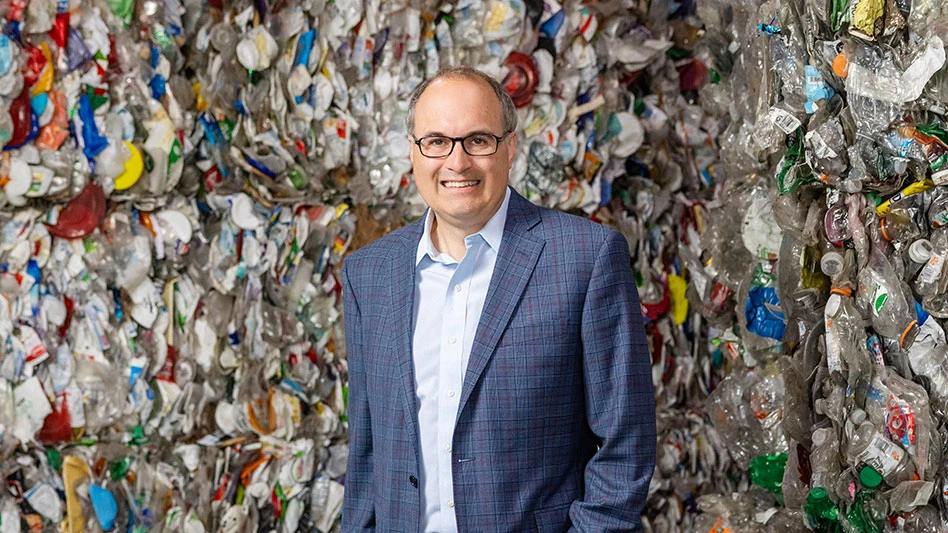
Photo courtesy of Recology
As cities and other California municipalities work to comply with Senate Bill 1383, which requires municipalities to divert 75 percent of organic material from landfills by 2025, San Francisco-based Recology says farmers are talking about the benefits of composting to their processes.
“Please place your food scraps in the green (curbside) compost bin,” says Bob Shaffer, an agronomist who advises farms on the West Coast, in Australia and operates a 100-acre farm in Hawaii. “Compost is the material that we as farmers need to apply to our soils to produce the best crops for your food—food that has the ability to support your health.”
Sandi McGinnis-Garcia of McGinnis Ranch, a fourth-generation family-run farm in the Monterey Bay area, encourages all city residents and businesses to participate in curbside composting programs.
“If everyone could do this one simple thing—put food scraps in your green bin—what a difference we can collectively make,” McGinnis-Garcia says. “Composting has many benefits to help our environment, soil health and sequestration of carbon when it breaks down in the soil, not to mention farmers need this organic matter to amend the soil to keep our crops healthy, retain water, and feed the soil to keep growing on what farmland we have left.”
RELATED: Shifting focus | Recology points to organics diversion in sustainability report
Debra Becker of Cordero Vineyards in southeastern Napa County says compost made from food scraps is nutrient-rich, benefits the soil, and “ultimately helps grow grapes that become a very nice glass of wine.”
Communities are starting to make a difference. California’s Department of Resources Recycling and Recovery (CalRecycle) reports that 75 percent of the state’s communities have residential organic waste collection programs in place or 460 of the 616 jurisdictions subject the SB 1383.
Given that communities have begun establishing organics collection programs, it’s even more important that residents get the message that they should participate in them.
“It’s very important for people in cities to fully participate in curbside food scrap collection for composting because we heavily rely on the use of good quality compost in our organic crop production,” says Frank Olagaray, the owner and operator of Thornton, California-based Blossom Vineyards, which grows almonds, walnuts and wine grapes with help from compost. “The compost allows us to move away from synthetic fertilizers in our conventional farming operations, which is ultimately better for soil health, crop health and health of the environment.”
San Francisco pioneered curbside food scrap collection for composting in 1996.
Working together, the city, residents and businesses and Recology have diverted more than 2 million tons of compostable material from landfills, the company says.
Still, there’s room for improvement. Recology Public Relations Manager Robert Reed says several challenges remain before the state’s organics diversion and composting programs are fully implemented.
“Challenges include encouraging and inspiring residents and businesses to fully participate in the program,” Reed says. “This is key. We help customers better understand that curbside composting is something we can all do every day to be part of the solution.”
The company also works with cities, businesses and schools to distribute video clips, newsletters, presents to schools and community groups and works with media companies to “get the word out.”
Another challenge that Reed says Recology and various communities are working on is the planning, permitting and construction of composting facilities and making sure residents have the curbside bins and kitchen pails necessary to collect compostable materials.
Los Angeles made curbside composting mandatory in January. San Diego delivered curbside composting bins to properties across the city this year and is building a large composting facility. The food scraps, sticks, and leaves customers put in curbside composting bins go to regional composting facilities, where they become finished compost. More than 90 percent of that compost is applied on local farms.
Recology is a 100 percent employee-owned integrated resource recovery company providing collection, recycling, curbside composting and outreach and education to customers throughout California, Oregon and Washington.
Recology finds new ways to recycle and compost what was once considered waste. Recology has more than 3,800 employees and serves 136 communities.





